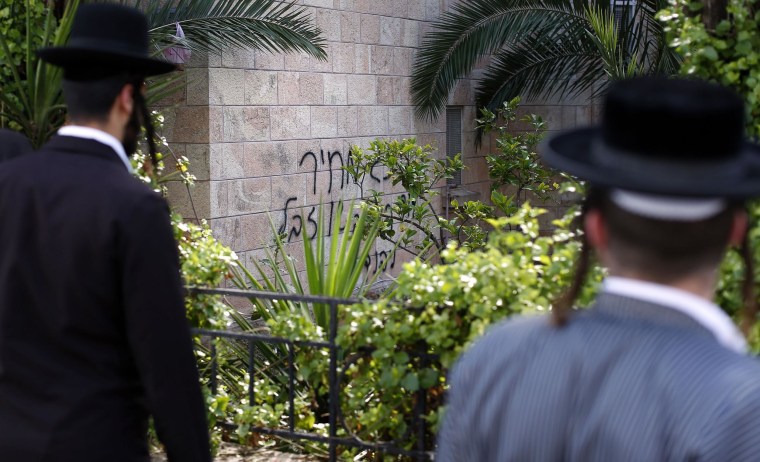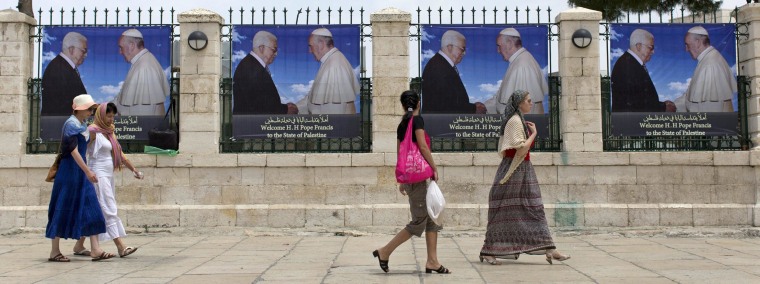ROME — Pope Francis sets out for his first trip to the Holy Land on Saturday in what he has called “a strictly religious visit,” but in a land where religion and politics are intertwined, he will walk a political tight-rope.
Traveling with a rabbi and a Muslim leader in tow as a nod to inter-faith dialogue, Francis will visit Jordan, the Palestinian Territories and Israel in a crowded, three-day trip.
Every word and move is likely to be dissected for political undertones, especially with the trip coming on the heels of failed Mideast peace talks. Even the pope’s labeling of his six-hour visit to Bethlehem as a visit to the “State of Palestine” is a controversial move, given that Israel rejects that terminology.
Here's a look at the pope's trip:
First stop: Jordan
The premise of the trip, which begins in Jordan, is to mark the 50th anniversary of the meeting in Jerusalem between Pope Paul VI and Patriarch Athenagoras, the spiritual head of the world’s Orthodox Christians. That event marked a turning point between the two major branches of Christianity that split with the Great Schism in 1054.
The anniversary also goes with Francis’ message of interfaith dialogue in the troubled region. The plummeting Christian population and their widespread persecution will also be at the top of the pope’s agenda.
During the Jordan stop, he will say Mass in a stadium filled with thousands of Christians who fled there from war-torn neighboring areas, including Palestine and Syria. He is also expected to visit Bethany Beyond the Jordan where, according to Christian belief, Jesus was baptized.
While Christians in the Middle East may have high hopes that Francis can ease their plight, Marie-Armelle Beaulieu, the Israel-based editor-in-chief of “Holy Land” magazine, says people don’t expect any miracles this weekend.
“Nobody believes that the pope has a magic stick to solve in two days where the Secretary of State John Kerry has failed. They hope that the visit of the pope will call attention to their real situation,” said Beaulieu.
“They want his smile, his improvisation, his laugh, his prayer, his understanding. They want to see him and just to say, ‘Wow, he just came for us.’”
Straight to the West Bank
Even though Francis is the fourth pope to visit the Holy Land, following Paul VI, John Paul II and Benedict — the latter most recently in 2009 — his trip will be paved by many firsts that will carry both a religious and political significance.
For the first time the official Vatican itinerary calls the Palestinian territories the “State of Palestine.” The designation reaffirms the Vatican’s 2012 vote at the United Nations’ general assembly giving Palestinians de-facto statehood. The vote and the Vatican’s support for it has angered Israel, which argues any change of status should only come through negotiations.
Just as significantly, on Sunday Francis will fly by helicopter directly from Amman, Jordan, to the Palestinian town of Bethlehem, initially bypassing Israel, where his predecessors always landed before moving on to the West Bank. The symbolic gesture will not only bypass a complicated security motorcade, but also strengthens the claim for Palestine to become an independent sovereign state.
While in Bethlehem, Francis will meet with Palestinian President Mahmoud Abbas — underlining the Vatican’s support for the change of Palestine’s status. Abbas has been happy to play up the support — welcome banners in Manger Square show the two leaders together under a “State of Palestine” caption.

Nod to the founder of Zionism
Francis will also make symbolic gestures to the Israelis during his whirlwind 16-event visit on Sunday evening and Monday: he will be the first pope to lay a wreath on grave of Theodore Herzl, the founder of Zionism.
Riccardo Pacifici, the president of the Jewish community in Rome, said the move is “an innovative gesture that not many head of states make. I hope this is a step forward in the diplomatic relations between Israel and the Vatican.”
On Monday he will visit the Western Wall, Mount Herzl and the Yad Vashem Holocaust memorial, and he will meet with the president, prime minister, chief rabbis and Grand Mufti of Jerusalem.
But his plan to say Mass on Monday evening on Mount Zion, believed to be the site of both Jesus’ last supper and the tomb of King David, has also sparked outrage among Orthodox Jews who say the space must not be used for Christian prayer.
The Vatican clearly hopes that the Francis’ traveling companions Rabbi Abraham Skorka and Islamic leader Omar Abboud, director of the Institute for Religious Dialogue in Buenos Aires – old friends from when he was a cardinal in Argentina – will help smooth the way and reinforce the idea that all three great monotheistic faiths can live in peace.
Vatican spokesman, Father Federico Lombardi, said that their presence is "an extremely strong and explicit signal" about the importance of inter-religious dialogue in the region.
Skorka will be in the Palestinian Territories and a key Islamic site in Jerusalem, while Abboud will be at the Western Wall sacred to Jews and the Yad Vashem memorial to the victims of the Holocaust.
Eye out for anti-Christian sentiment
Local authorities also hope the show of unity will deter orthodox Jews from demonstrating against Francis’ visits to Jerusalem’s holy sites, following a worrying increase in hate crimes against Christian symbols and buildings in the city.
In the weeks leading up to the pope’s visit, Christian churches have been defaced and blasphemous slurs were been painted on the city’s walls; one piece of graffiti read "Death to Arabs and Christians and all those who hate Israel.”
While local authorities gave reassurance that security will be tight – Israel says they will deploy thousands of police officers – Francis mission to be one-with-the-people is not helping to ease worries.
Once again, he has chosen not to travel in armored vehicles, and has opted to greet locals on an open-deck jeep, and travel in a regular car. A gesture that shows, once again, that his trust in interfaith dialogue is stronger than his fear of religious hatred.
NBC News’ Petra Cahill and Reuters contributed to this story.
